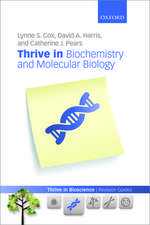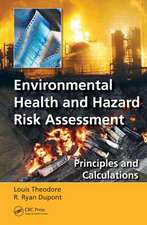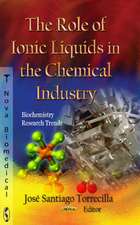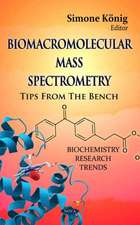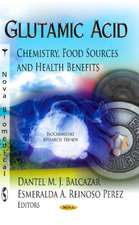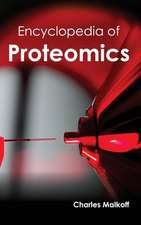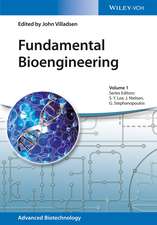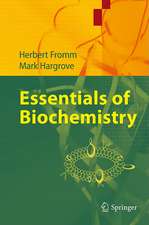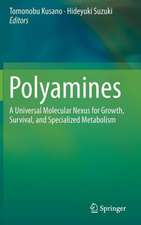Bioreaction Engineering Principles
Autor John Villadsen, Jens Nielsen, Gunnar Lidénen Limba Engleză Hardback – 15 iul 2011
| Toate formatele și edițiile | Preț | Express |
|---|---|---|
| Paperback (1) | 657.65 lei 6-8 săpt. | |
| Springer Us – oct 2014 | 657.65 lei 6-8 săpt. | |
| Hardback (1) | 663.02 lei 6-8 săpt. | |
| Springer Us – 15 iul 2011 | 663.02 lei 6-8 săpt. |
Preț: 663.02 lei
Preț vechi: 780.02 lei
-15% Nou
Puncte Express: 995
Preț estimativ în valută:
126.90€ • 130.78$ • 107.14£
126.90€ • 130.78$ • 107.14£
Carte tipărită la comandă
Livrare economică 04-18 martie
Preluare comenzi: 021 569.72.76
Specificații
ISBN-13: 9781441996879
ISBN-10: 1441996877
Pagini: 400
Ilustrații: XXX, 561 p.
Dimensiuni: 155 x 235 x 41 mm
Greutate: 1.05 kg
Ediția:3rd ed. 2011
Editura: Springer Us
Colecția Springer
Locul publicării:New York, NY, United States
ISBN-10: 1441996877
Pagini: 400
Ilustrații: XXX, 561 p.
Dimensiuni: 155 x 235 x 41 mm
Greutate: 1.05 kg
Ediția:3rd ed. 2011
Editura: Springer Us
Colecția Springer
Locul publicării:New York, NY, United States
Public țintă
GraduateCuprins
What is this book about?.- Chemicals from Metabolic Pathways.- Elemental and Redox Balances.- Thermodynamics of Bioreactions.- Biochemical Reaction Networks.- Enzyme Kinetics and Metabolic Control Analysis.- Growth Kinetics of Cell Cultures.- Population Balance Equations.- Design of Fermentation Processes.- Gas-Liquid Mass Transfer.- Scale–up of Bioprocesses
Textul de pe ultima copertă
The present text is a complete revision of the 2nd edition from 2003 of the book with the same title. In recognition of the fast pace at which biotechnology is moving we have rewritten several chapters to include new scientific progress in the field from 2000 to 2010.
More important we have changed the focus of the book to support its use, not only in universities, but also as a guide to design new processes and equipment in the bio-industry.
A new chapter has been included on the prospects of the bio-refinery to replace many of the oil- and gas based processes for production of especially bulk chemicals. This chapter also serves to make students in Chemical Engineering and in the Bio-Sciences enthusiastic about the whole research field.
As in previous editions we hope that the book can be used as textbook for classes, even at the undergraduate level, where chemical engineering students come to work side by side with students from biochemistry and microbiology.
To help the chemical engineering students Chapter 1 includes a brief review of the most important parts of microbial metabolism. In our opinion this review is sufficient to understand microbial physiology at a sufficiently high level to profit from the rest of the book. Likewise the bio-students will not be overwhelmed by mathematics, but since the objective of the book is to teach quantitative process analysis and process design at a hands-on level some mathematics and model analysis is needed. We hope that the about 100 detailed examples and text notes, together with many instructive problems will be sufficient to illustrate how model analysis is used, also in Bio-reaction Engineering.
More important we have changed the focus of the book to support its use, not only in universities, but also as a guide to design new processes and equipment in the bio-industry.
A new chapter has been included on the prospects of the bio-refinery to replace many of the oil- and gas based processes for production of especially bulk chemicals. This chapter also serves to make students in Chemical Engineering and in the Bio-Sciences enthusiastic about the whole research field.
As in previous editions we hope that the book can be used as textbook for classes, even at the undergraduate level, where chemical engineering students come to work side by side with students from biochemistry and microbiology.
To help the chemical engineering students Chapter 1 includes a brief review of the most important parts of microbial metabolism. In our opinion this review is sufficient to understand microbial physiology at a sufficiently high level to profit from the rest of the book. Likewise the bio-students will not be overwhelmed by mathematics, but since the objective of the book is to teach quantitative process analysis and process design at a hands-on level some mathematics and model analysis is needed. We hope that the about 100 detailed examples and text notes, together with many instructive problems will be sufficient to illustrate how model analysis is used, also in Bio-reaction Engineering.
Caracteristici
Complete revision of the 2nd edition from 2003 New chapter has been included on the prospects of bio-refinery Around 100 detailed figures included in text Includes supplementary material: sn.pub/extras


